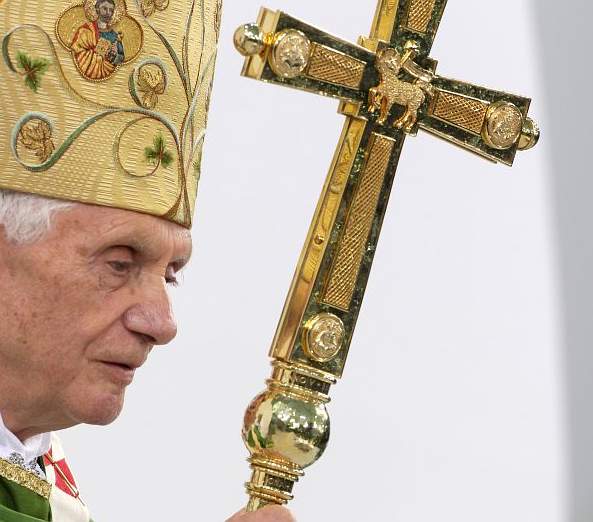Pave Benedikts triumf i Tyskland
 Peter Seewald har skrevet flere bøker om kardinal Ratzinger/pave Benedikt og uttaler seg interessant om pavens siste besøk i Tyskland. Han sier bl.a.:
Peter Seewald har skrevet flere bøker om kardinal Ratzinger/pave Benedikt og uttaler seg interessant om pavens siste besøk i Tyskland. Han sier bl.a.:
The Kath.net interviewer asked Seewald who the Pope was referring to when he said during the vigil with young people, “(D)amage to the Church comes not from her opponents but from uncommitted Christians.” Seewald replied, “Probably you and me. The Pope is an encourager and a builder of bridges, but he also warns us. Every Christian needs new impulses to keep from becoming stagnant in his development, in his journey, his witness and his Christian conduct.”
Later in the interview Seewald said the Pope came to Germany to draw attention to problems, because “he does not want a fictitious peace but rather one that is genuine. He is anything but someone who covers things up with nice words or tries to put make-up on the seriousness of the situation with massive events, contrary to what (Hans) Kung and his friends assert.”
Først og fremst er intervjuet med Seewald et tydelig uttrykk for at pavens besøk i Tyskland var svært vellykket:
In an interview with the Kath.net news agency sent to CNA for publication, German Catholic reporter Peter Seewald said the recent papal trip to Germany was a victory for the humility and message of the Pope.
In the interview, Seewald, author of “Light of the World,” described the Pope’s visit as “a small miracle” because “shortly before there was a very aggressive, anti-clerical assault by the media.”
“All of this brings to mind George Orwell’s ‘1984,’ in which an imaginary enemy, a nightmare, is created in order to scare people.” “And yet,” Seewald noted, “despite all of this incredible effort by the media, an innumerable amount of people stood up and refused to be deceived.”
“They said the Germans would turn their backs on him and all kinds of other stupidities. There appears to be nothing more offensive in our times than being Catholic. As the magazine ‘Stern’ said, ‘The brief euphoria at the outset was followed by an irreparable distancing between the majority of Germans and their fellow countryman.’ It’s as if they were saying that everything would be wonderful and orderly in the world if the Vatican just ceased to exist.”
However, Seewald continued, “We were all witnesses to something much greater. Where were all the masses of critics and protesters? They never showed up. And yet 350,000 people made great sacrifices in order to personally listen to the Pope and to attend Mass with him. Millions watched on television. The Pope’s books are selling faster than ever … And undoubtedly never before has so much intelligence, wisdom and truth, so much of what is fundamental, been heard in Germany.”
According to Seewald, whose own conversion to Catholicism came after meeting then-Cardinal Ratzinger, “(t)hese words can no longer be ignored. They are the measure and the touchstone for the subsequent debates and the renewal of the Catholic Church in Germany.” The only “shadows” of the Pope’s trip to Germany were the massive attacks against him by the media, he said. …

 Vårt Land hadde i sin papirutgave i går en overraskende artikkel med overskrift «Paven hyller Luther», som i alle fall er en hel del bedre enn «Strides om paven tilga Luther», som
Vårt Land hadde i sin papirutgave i går en overraskende artikkel med overskrift «Paven hyller Luther», som i alle fall er en hel del bedre enn «Strides om paven tilga Luther», som 

 29. juni 1951 ble over 40 unge menn ordinert samtidig, og jeg husker at jeg leste akkurat dette (spesielt andre avsnitt) i boka der pave Benedikt skriver om de første 50 år av sitt liv; «Milestones: Memoirs 1927-1977».
29. juni 1951 ble over 40 unge menn ordinert samtidig, og jeg husker at jeg leste akkurat dette (spesielt andre avsnitt) i boka der pave Benedikt skriver om de første 50 år av sitt liv; «Milestones: Memoirs 1927-1977».